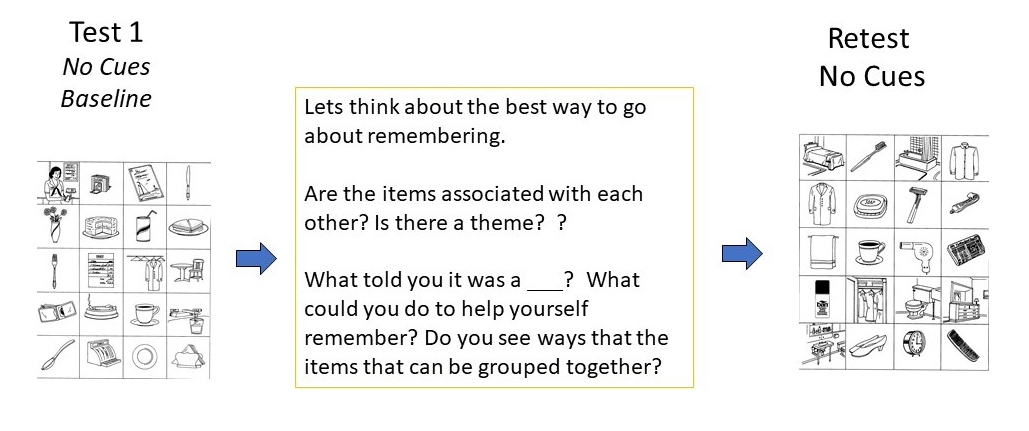CMT2-. Initial online prototype version will be available. Both adult and children versions
Press above link to register at CMT-2 website (separate website)
Choose from 4 Scenes:
1. Restaurant (Adult or Children) 2. Morning (adult) 3. Morning - (children) 4.School (children)
Automatic Summary and Narrative report is generated.
See FAQ’s for additional information
Components of the Contextual Memory Test
Awareness before and after the task
General questioning
Specific prediction/estimation
Recall of 20 Objects
Immediate Recall
Delayed Recall
Spontaneous Strategy Use
Strategy probing & analysis of recall order
Part II - Theme can be Provided (Induced Encoding) or Test-Teach-Retest Format can be used as indicated below
The original CMT is No Longer Available from Publisher - The Web version (CMT-2) is in a Pilot Phase and is available Free of Charge. A PAPER version of the CMT-2 with laminated Test Plates AND RECORDING FORMS will be Available SOON on this website.
CMT can also be used with a Test-Teach — Retest Dynamic Format
Mediation & Strategy Generation - Immediately After Baseline or Test 1, followed by retest with a different version
Initial Research & Publications on the Contextual Memory Test
Journal Articles that include studies using the CMT
Chang, L. H., Chen, P. Y., Wang, J., Shih, B. H., Tseng, Y. H., & Mao, H. F. (2021). High-ecological cognitive intervention to improve cognitive skills and cognitive–functional performance for older adults with mild cognitive impairment. The American Journal of Occupational Therapy, 75(5).
Dirette, D. P. (2015). A comparison of self-generated versus taught internal strategies for working memory. NeuroRehabilitation, 36(2), 187-194.
Engel-Yeger, B, Durr, D.H. & Josman, N. (2010). Comparison of memory and meta-memory abilities of children with cochlear implant and normal hearing peers. Disability and Rehabilitation, (Aug) 1-8
Goverover, Y., Chiaravalloti, N., Genova, H., & DeLuca, J. (2018). A randomized controlled trial to treat impaired learning and memory in multiple sclerosis: The self-GEN trial. Multiple Sclerosis Journal, 24(8), 1096-1104.
Goverover, Y., Sharan, S., Krupp, L., & DeLuca, J. (2024). Exploring the Efficacy of a Remote Strategy-Based Intervention for People With Multiple Sclerosis With Everyday Memory Impairments: A Pilot Study. The American Journal of Occupational Therapy, 78(4), 7804205020.
ViShnuPRiya, V., SANKAR, G. U., & RaVikuMaR, M. (2024). Effectiveness of an Occupational Therapy Memory Strategy Education Group Intervention on Memory Difficulties and Activities of Daily Living Performance among the Geriatric Population: A Quasi-experimental Study. Journal of Clinical & Diagnostic Research, 18(1).
Yang, S. Y., Lin, Y. C., Lee, Y. C., Hsieh, P. L., & Lin, Y. L. (2022). Board Game Intervention to Improve Cognitive and Daily Functioning in Elderly People with Mild Cognitive Impairment: A Randomized Controlled Trial. International Journal of Gerontology, 16(4).
CMT Book Chapter
Raphael-Greenfield, E., Toglia, J., Hartman, A. (2020). The Contextual Memory Test. In B. J. Hemphill-Pearson and C. K. Urish (Eds.) Assessments in Occupational Therapy Mental Health: An Integrative Approach (4th Ed.). Slack Inc: Thorofare, NJ.












